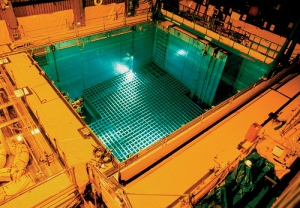The US Nuclear Regulatory Commission announced Tuesday it would suspend the issuing of new reactor operating licenses, license renewals and construction licenses until the agency crafted a plan for dealing with the nation’s growing spent nuclear fuel crisis. The action comes in response to a June ruling by the US Court of Appeals that found the NRC’s “Waste Confidence Decision”–the methodology used to evaluate the dangers of nuclear waste storage–was wholly inadequate and posed a danger to public health and the environment.
Prior to the court’s ruling, the Commission had evaluated licensing and relicensing with the assumption that spent fuel–currently stored on site at nuclear power plants in pools and dry casks–would soon be moved to a central long-term waste repository. As previously noted, that option was once thought to be Yucca Mountain, but after years of preliminary work and tens of millions of dollars wasted, Yucca was found to be a poor choice, and the Obama Department of Energy and the NRC ended the project. The confirmation of new NRC Chair Allison Macfarlane–considered a nuclear waste expert and on record as a Yucca Mountain critic–focused even more attention on the country’s lack of realistic plans for safe, permanent waste storage.
The release from the Nuclear Regulatory Commission [PDF] put it this way:
Waste confidence undergirds certain agency licensing decisions, in particular new reactor licensing and reactor license renewal.
Because of the recent court ruling striking down our current waste confidence provisions, we are now considering all available options for resolving the waste confidence issue, which could include generic or site-specific NRC actions, or some combination of both. We have not yet determined a course of action.
In recognition of our duties under the law, we will not issue licenses dependent upon the Waste Confidence Decision or the Temporary Storage Rule until the court’s remand is appropriately addressed.
What this means in real terms remains to be seen. No licenses or renewals were thought imminent. Next up were likely a decision on extending the life of Indian Point, a short drive north of New York City, and a Construction and Operation License for Florida’s Levy County project, but neither was expected before sometime next year. Officially, 19 final reactor decisions are now on hold, though the NRC stressed that “all licensing reviews and proceedings should continue to move forward.”
Still, this should be read as a victory for the originators of the suit that resulted in the June ruling–the Attorneys General of Connecticut, New Jersey, New York and Vermont in coordination with the Prairie Island Indian Community of Minnesota and environmental groups represented by the National Resources Defense Council–and most certainly for the millions of Americans that live close to nuclear plants and their large, overstuffed, under-regulated pools of dangerous nuclear waste. Complainants not only won the freeze on licensing, the NRC guaranteed that any new generic waste rule would be open to public comment and environmental assessment or environmental impact studies, and that site-specific cases would be subject to a minimum 60-day consideration period.
While there is still plenty of gray area in that guarantee, the NRC has (under pressure) made the process more transparent than most similar dealings at the agency. The commission has also, at least for the moment, formally acknowledged that the nation’s nuclear reactor fleet faces a very pressing problem.
The US has 72,000 tons of radioactive waste and generates an additional 2,000 tons every year. Spent fuel pools at individual sites are already so full they pose numerous threats, some eerily similar to the ongoing disaster at Fukushima. Dry cask storage poses other problems and much additional expense. And regional interim waste storage facilities, an idea possibly favored by Macfarlane, is problematic for many reasons, not the least of which is that no sites have yet been designated or built.
But nuclear plant operators, already burdened by the spiraling costs of a poorly maintained and aging inventory, are desperate to have the federal government take the waste problem off their backs–and off their books. Whether that is even technically feasible, let alone politically of fiscally possible, remains to be seen. But the NRC has at least recognized–or at least been forced to recognize–that the nuclear industry should not be allowed to create waste indefinitely without a plan to safely secure what is already on hand.


FYI: If you would like an easy-to-read look at daily life in a US nuclear plant, and what a bad day might be like, my novel “Rad Decision” tells the story in a way that allows a lay person to follow along and understand what the real problems were. The book is free online (no advertisements or sponsors) at http://RadDecision.blogspot.com . I’ve been working away at atomic plants for some years now and can provide an insider’s viewpoint. (Bonus: the plan designt and bad day resemble Fukushima.) The book has garnered a lot of positive reviews from readers but no attention from the media – they’re busy, I guess. I’m afraid it doesn’t discuss nuclear waste in detail, though.
James, aside from your fictional pursuits, do you have a personal opinion on nuclear waste storage or the long-term prognosis for nuclear energy? Are you still employed by the industry?
Once again we see the same old story. Make sure that any revenues stemming from (this most dangerous energy source) the generation of electricity from radioactive material is kept in private hands while the massive exigent liabilities are stuffed into the public’s pocket. Nice friggin work if you can get it…
Now… where did I leave that airsick bag???